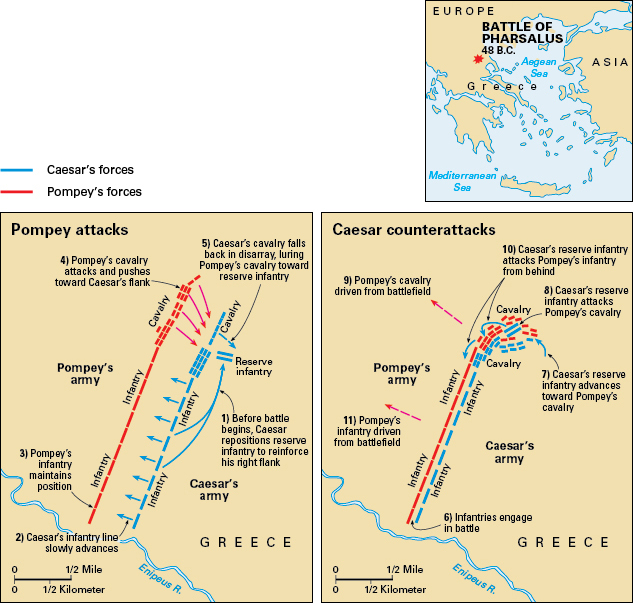Pompey, << PAHM pee, >> the Great (106-48 B.C.) was an outstanding Roman general and statesman. He served as consul, Rome’s highest-ranking elected official, three times—in 70, 55, and 52 B.C. Pompey and two other Roman leaders—Julius Caesar and Marcus Licinius Crassus—formed an unofficial political alliance known as the First Triumvirate.

A general’s son, Pompey was born Gnaeus Pompeius on Sept. 29, 106 B.C., in Rome. He raised an army in 83 B.C. to help Lucius Sulla in his struggle to control Rome. Pompey won victories over Sulla’s enemies in Italy, Sicily, and Africa and earned a reputation for brutality.
Sulla died in 78 B.C. In 77 B.C., the consul Marcus Lepidus went to war to overturn reforms that Sulla had made to the Roman Constitution. The Senate gave command of an army to Pompey, who helped defeat Lepidus. Pompey then traveled to the Roman province of Hispania (now Spain and Portugal) and helped defeat Sertorius, an old enemy of Sulla. In 71 B.C., he returned to Italy and tried to take credit for ending a slave revolt led by Spartacus, whom Marcus Crassus had defeated.
Pompey and Crassus used their army to force the Senate to make them consuls in 70 B.C. They restored certain powers, which Sulla had taken away, to the tribunes (the people’s elected representatives) and passed other popular legislation. In 67 B.C., Pompey rid the Mediterranean Sea of pirates. From 66 to 62 B.C., he conquered King Mithridates VI of Pontus, in Asia Minor (now part of Turkey); King Tigranes II of Armenia; and King Antiochus XIII of Syria. He also captured Jerusalem.
The Senate would not approve the peace agreements Pompey had made after his victories and refused to reward his troops. Pompey was outraged. In 60 B.C., he formed the First Triumvirate with Crassus and Caesar (see Triumvirate ). The trio worked together to advance their careers. In 59 B.C., Pompey married Caesar’s daughter, Julia. After the deaths of Julia and Crassus, in 54 and 53 B.C., relations between Pompey and Caesar worsened. In 49 B.C., civil war broke out between Caesar and members of the Senate. Pompey opposed Caesar in the war. Caesar’s forces defeated those of Pompey at Pharsalus, Greece, in 48 B.C. Pompey fled to Egypt, where Pharaoh Ptolemy XIII had him murdered on September 28.
